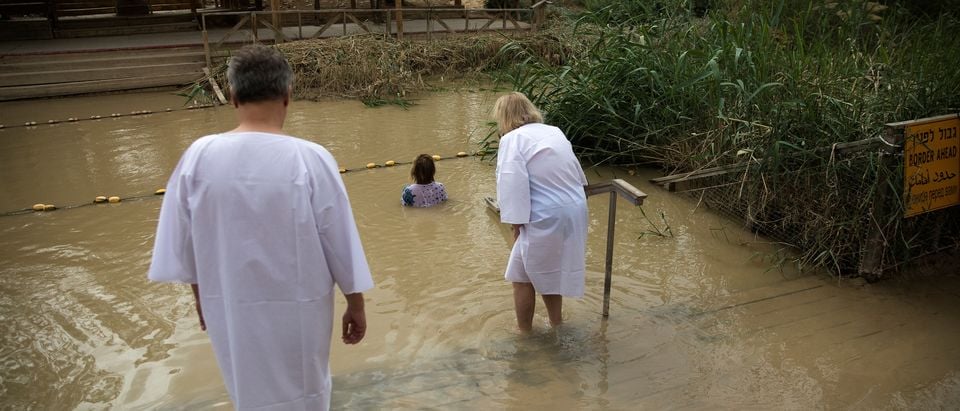One of the greatest contrasts in water abundance and scarcity anywhere in the world starts in our backyard. Our Great Lakes, bordering eight U.S. states and two Canadian provinces, contains over 21 percent of the world’s surface freshwater and provides clean water to over 50 million people.
Governing this massive and valuable resource isn’t easy. So 15 years ago, Mayors Richard Daley of Chicago and David Miller of Toronto formed the Great Lakes-St. Lawrence Cities Initiative that now engages hundreds of mayors whose cities share these shores, and receives $300 million annually for resource protection under the Great Lakes Restoration Initiative passed during George W. Bush Administration. The coalition tackles a wide range of issues, from climate change to oil transport and shipping issues, invasive species to nuclear waste management. No matter how complex, we’ve got to make our shared resource work for all.
Now imagine the Jordan River Valley, that Biblical water source of life and sustenance that connects Israel, Jordan and the Palestinian territories. The Dead Sea and Sea of Galilee are drying up as water is over-pumped for agriculture, growing populations and refugee influx further impacted by climate change. Jordan is struggling with a massive influx of Syrian refugees, partially due to climate change and failed water governance in neighboring Syria. The lack of adequate infrastructure to treat sewage in parts of Jordan, West Bank and Gaza results in sewage running down in the streets of Gaza and dumping into the Jordan River. Kids are getting sick and dying from preventable disease.
Consider that in Gaza, 97 percent of the groundwater is no longer potable and by 2020, just two years from now, 100 percent of the groundwater will be polluted according to the United Nations. It’s a global security issue that will leave no country in the region immune to the cross-border water crisis, including Israel.
The day-to-day reality of access to enough clean drinking water, electricity and waste treatment demands cooperation, and failure to work together leads to problems for all sides. Our own North American communities include citizens who have fled violence magnified by drought. We know that most people do not want to leave their homes and communities, and when appropriate and proactive measures and agreements are made to help families gain sustainable access to adequate water and food, people are less likely to flee.
Now mayors across the U.S. and Canadian Great Lakes region are working to change that, sharing our years of cross-border cooperation, creating authorities and resolving issues that manage based on ecosystems, not state lines. A pioneering non-profit called EcoPeace Middle East started bringing us to the region to see the water struggles firsthand. Now we are shepherding an agreement among a group of Mideast mayors to save the Jordan River Valley. We believe if the mayors of the region collaborate, it will pressure all three countries with authority over the Jordan River Valley to create the political will to reduce risk and make foreign investment viable.
Investment is vital. The U.S. spends $3.3 billion in military aid to Israel and $1.5 billion to Jordan. We understand the need to provide military protection within the region, but if we want peace and increased economic security, U.S. foreign assistance — public and private — can help to support interdependent projects like desalination along the Mediterranean (Israel and Gaza) powered by solar-based electricity (produced in Jordan), which creates water security region-wide and produces water to replenish the Jordan River.
We can’t shake what Gidon Bromberg, Israeli co-director of EcoPeace Middle East, said during our recent visit to the region, “People won’t come to the border with guns, they will come to the border with buckets, desperate for drinking water.” Nothing is more fundamental to life itself than water. Security is not going to be about who has the most ammunition or land; it’s going to be about who has water. People will fight for water, but historically, they will more often cooperate for it.
Right now, the Jordan River Valley is expected future is running out of water. At the heart of the matter are not just the humanitarian issues, which are great, but the very question of any future at all. While many issues amongst Israelis, Jordanians and Palestinians feel intractable, this one is not if the region’s mayors can be the force for change as we’ve done in the Great Lakes.
John Dickert (@JohnTDickert) is president and CEO of the Great Lakes and St. Lawrence Cities Initiative, and former three-term mayor of Racine, Wisconsin, on the shores of Lake Michigan.
Sherri Goodman (@GoodmanSherri) is a former U.S. deputy undersecretary of Defense (environmental security). She is presently a senior strategist at the Center for Climate & Security and a senior fellow at the Woodrow Wilson International Center.
The views and opinions expressed in this commentary are those of the author and do not reflect the official position of The Daily Caller.


